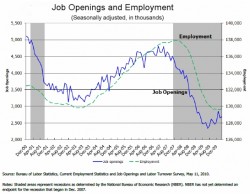 As the nation and the world emerge from the depths of the recession, labor economists tell us that this recovery will be slower and bumpier than most Americans living today can remember. Like the Great Depression of the 1930s, this one will leave its scars on the economy and the national psyche. Employers will feel its consequences rippling through their workforce and their recruiting efforts, with effects lasting for years, if not an entire generation.
As the nation and the world emerge from the depths of the recession, labor economists tell us that this recovery will be slower and bumpier than most Americans living today can remember. Like the Great Depression of the 1930s, this one will leave its scars on the economy and the national psyche. Employers will feel its consequences rippling through their workforce and their recruiting efforts, with effects lasting for years, if not an entire generation.
What are the consequences for employers? What are the long-lasting changes the recession has wrought on the recruiting and retention of workers? There are several, say industry leaders, vendors, suppliers and individual recruiters.
Foremost, probably predictably, is the need to rebuild recruiting programs. Beyond that, there are almost as many opinions concerning the recession’s impacts as there are people I asked about it. Some predict that the cuts to job board spending will be permanent; others say social media recruiting will become a key sourcing tool, others suspect it will never amount to more than a minor tool; most expect that recruiting will be held to a higher standard of performance and economy.
Out of all the predictions and expectations — those I solicited and those I came across in discussions and blog posts and even tweets — I distilled four broad trends. You can read about these in more depth in the July issue of the Journal of Corporate Recruiting Leadership. For now, here’s a brief look at these trends.
More will be demanded of recruiting efforts as employers focus on ROI.
The data shows that worker productivity rose during the recession even in the face of such demoralizing necessities as layoffs, wage freezes, and cut or limited benefits. Recruiters will be pushed to hire more of the kind of workers who can maintain the momentum, and will be increasingly judged on the performance of their hires. The emphasis to control costs won’t abate, sending recruiters looking for alternatives to traditional sourcing channels. Among the beneficiaries will be pay-for-performance job posting, SEO, and corporate career sites.
Reliance on RPOs and staffing firms will grow.
This is a controversial trend in that there’s not general agreement it has longevity. The RPOs right now are flush, as employers who gutted their recruiting departments suddenly find themselves in a hiring bind. Smaller companies, who may have relied on a generalist to handle recruiting, are making first time calls to RPOs. Mary Delaney, CEO of Personified, CareerBuilder’s RPO and recruitment consultancy, says the agency’s revenues jumped dramatically in the first quarter as her 120 recruiters conducted an ever-increasing number of searches.
The question is: can the RPOs hang on to the new business and gain acceptance as a replacement for in-house recruiters, or are the services destined to be mostly supplemental?
Assessment usage will expand as companies struggle to make better hiring choices.
Whether it’s done in house or outsourced, candidates are undergoing reviews that are more rigorous and demanding. And as the stakes get greater, so does the testing. Forbes reported this week that “psychological scrutiny and rigorous simulations are fast becoming a requisite part of the interview process.” The magazine said that a two-day CEO assessment can cost as much as $25,000 per candidate.
Retaining and promoting talented workers will present unique problems as senior staff delays retirement.
Mark Mather, associate vice president of the Population Reference Bureau, says boomers are now expecting to work beyond the traditional retirement age of 65. A Rand study says that the proportion of workers ages 65-75 is expected to rise to 25 percent this year, up from 17 percent 20 years ago.